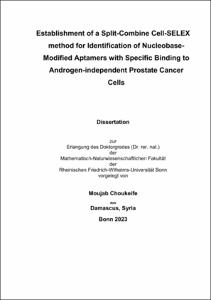Choukeife, Moujab: Establishment of a Split-Combine Cell-SELEX method for Identification of Nucleobase-Modified Aptamers with Specific Binding to Androgen-independent Prostate Cancer Cells. - Bonn, 2023. - Dissertation, Rheinische Friedrich-Wilhelms-Universität Bonn.
Online-Ausgabe in bonndoc: https://nbn-resolving.org/urn:nbn:de:hbz:5-72161
Online-Ausgabe in bonndoc: https://nbn-resolving.org/urn:nbn:de:hbz:5-72161
@phdthesis{handle:20.500.11811/11033,
urn: https://nbn-resolving.org/urn:nbn:de:hbz:5-72161,
author = {{Moujab Choukeife}},
title = {Establishment of a Split-Combine Cell-SELEX method for Identification of Nucleobase-Modified Aptamers with Specific Binding to Androgen-independent Prostate Cancer Cells},
school = {Rheinische Friedrich-Wilhelms-Universität Bonn},
year = 2023,
month = sep,
note = {Prostate cancer is the most commonly diagnosed malignancy and the second leading cause of cancer-related mortality in men in the United States. Current therapies, such as chemotherapy, radiotherapy, and photothermal therapy, lack specificity and can cause serious side effects. To address this issue, targeted therapy has gained attention, with antibody-mediated therapy being a mainstay due to its highly specific properties. However, the high cost of production and immunogenicity limit its clinical application. Aptamer-based targeted therapeutics offer several advantages over antibody therapies and have been explored as a potential solution. Aptamers are low molecular ligands, consisting of single-stranded DNA or RNA that can fold into a three-dimensional structure, allowing them to bind with high affinity to specific targets. Aptamers show significant potential in therapeutics and diagnostics, but their ability to interact with a target is limited by the chemical diversity of natural nucleobases. To overcome this challenge, functional groups can be added to the nucleobases to increase chemical diversity. Split-combine SELEX is a technique that enables screening of multiple modifications to the target of interest in a single selection, resulting in the enrichment of nucleobase-modified aptamers with different modifications or the most suitable modification for the selected target. This study introduces a novel approach called split-combine cell SELEX, which utilizes this technology and implemented in the cell-SELEX method to select nucleobase-modified aptamers against prostate cancer cells. Through this method, a new class of clickmers was discovered, which showed the ability to recognize prostate cancer cells with different modifications. It was observed that each modification had a unique impact on the clickmers' binding properties towards prostate cancer cells. Additionally, the S1 aptamer was found to be able to recognize breast cancer cells (MCF-7) when modified with a cyclic-RGD (cRGD), while other modifications (Imidazole) did not produce the same results. Overall, these findings provide insight into the potential of nucleobase-modified aptamers and their diverse binding properties towards cancer cells.},
url = {https://hdl.handle.net/20.500.11811/11033}
}
urn: https://nbn-resolving.org/urn:nbn:de:hbz:5-72161,
author = {{Moujab Choukeife}},
title = {Establishment of a Split-Combine Cell-SELEX method for Identification of Nucleobase-Modified Aptamers with Specific Binding to Androgen-independent Prostate Cancer Cells},
school = {Rheinische Friedrich-Wilhelms-Universität Bonn},
year = 2023,
month = sep,
note = {Prostate cancer is the most commonly diagnosed malignancy and the second leading cause of cancer-related mortality in men in the United States. Current therapies, such as chemotherapy, radiotherapy, and photothermal therapy, lack specificity and can cause serious side effects. To address this issue, targeted therapy has gained attention, with antibody-mediated therapy being a mainstay due to its highly specific properties. However, the high cost of production and immunogenicity limit its clinical application. Aptamer-based targeted therapeutics offer several advantages over antibody therapies and have been explored as a potential solution. Aptamers are low molecular ligands, consisting of single-stranded DNA or RNA that can fold into a three-dimensional structure, allowing them to bind with high affinity to specific targets. Aptamers show significant potential in therapeutics and diagnostics, but their ability to interact with a target is limited by the chemical diversity of natural nucleobases. To overcome this challenge, functional groups can be added to the nucleobases to increase chemical diversity. Split-combine SELEX is a technique that enables screening of multiple modifications to the target of interest in a single selection, resulting in the enrichment of nucleobase-modified aptamers with different modifications or the most suitable modification for the selected target. This study introduces a novel approach called split-combine cell SELEX, which utilizes this technology and implemented in the cell-SELEX method to select nucleobase-modified aptamers against prostate cancer cells. Through this method, a new class of clickmers was discovered, which showed the ability to recognize prostate cancer cells with different modifications. It was observed that each modification had a unique impact on the clickmers' binding properties towards prostate cancer cells. Additionally, the S1 aptamer was found to be able to recognize breast cancer cells (MCF-7) when modified with a cyclic-RGD (cRGD), while other modifications (Imidazole) did not produce the same results. Overall, these findings provide insight into the potential of nucleobase-modified aptamers and their diverse binding properties towards cancer cells.},
url = {https://hdl.handle.net/20.500.11811/11033}
}






